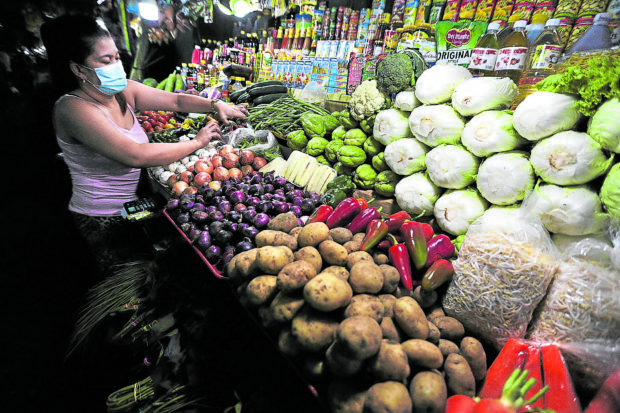
A market vendor tends to her stall in Commonwealth Market in Quezon City. This photo was taken on Aug. 9, 2020. (File photo by GRIG C. MONTEGRANDE / Philippine Daily Inquirer)
MANILA, Philippines — The decision of President Ferdinand Marcos Jr. to approve the extension of lower tariffs on essential imported food items, including rice, is good, but long-term policies are needed to address food supply issues.
Senate Majority Leader Joel Villanueva and Senators Risa Hontiveros and Grace Poe issued separate statements on Monday sharing the same sentiments.
“The more important thing to do, I believe, is to strengthen and continue modernizing our agricultural sector to ensure food security and sustainability and, at the same time, promote job creation in this sector,” Villanueva said in his statement.
“Not every day is Christmas, and we need to put food on the table of every Filipino family the whole year round.”
According to him, that was why Senate Resolution No. 385 was filed – to investigate how the government can ensure food security as a sustainable policy by strengthening agriculture and fisheries.
Villanueva also called for a review of the Agriculture and Fisheries Modernization Act of 1997 so that could be updated to respond to current socioeconomic realities.
In her statement, Hontiveros said long-term rather than just “Band-Aid solutions” would better solve high commodity prices.
“The agriculture sector needs to be strengthened, and an important step is to have an agriculture secretary who will focus on the widespread food problem and not just pour resources into rice [imports],” Hontiveros said in Filipino.
She also called for the lowering of the tax on coal, one of the most main sources of energy in the country. At the same time, she stressed the importance of finding renewable energy sources to offset the rising price of electricity.
Poe, for her part, said that it should be determined whether Executive Order No. 171, which extended the lower tariffs on essential food items, really achieved its goals of lowering prices.
Countries outside of the Association of Southeast Asian Nations, such as Pakistan, could already import rice at lower prices without bringing down tariffs, Poe said.
In fact, she said, the Federation of Free Farmers and Samahang Industriya ng Agrikultura (Sinag) have already raised concerns about the revenue loss to the government due to lower tariffs.
Poe also pointed out that the issue concerning pork was the volume of importation. Citing data from the National Meat Inspection Service, she said the volume of imported pork was still above 100,000 tons, or 30 percent higher than in 2021.
Importers have also stated that they have been stockpiling ahead of the expiration of EO No. 171.
“We need to see if there was profiteering. Sinag has been complaining about the drop in farmgate prices of pork yet retail prices were hardly moving. The extension of EO No. 171 now is no assurance that prices will go down soon as it is just extending what is,” Poe said.
The government, she insisted, must implement policies “that take on a longer view of the situation with a wider perspective.”
“Do we want to permanently depend on imported food products and subject food prices to fluctuations in the foreign exchange or do we want to be self-sufficient?” she said.
Measures that aim to bring down prices for consumers must also go hand in hand with measures that will support food producers going forward, according to Poe.
“Let’s check if the price of rice and pork really dropped — in the middle of the hardships our ordinary consumers are going through and the plight of our farmers. The syndicates of hoarders and smugglers who allegedly caused the price increase of agricultural products such as rice and onions should also be punished,” she said.
RELATED STORIES
Bongbong Marcos OKs extension of lower tariffs on pork, coal, corn, rice
Agri groups raise ‘grave concern’ about continued food importation, lower tariffs